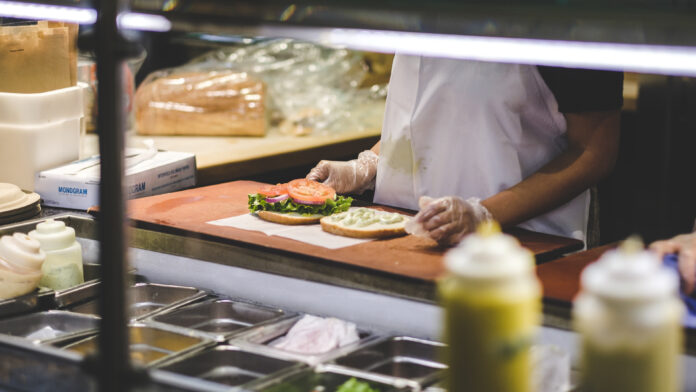CoHo switches from avocado spread to individually wrapped avocados, demonstrating trade-offs made for sustainability
In Fall Quarter 2019, the CoHo introduced an unlisted change to its menu: instead of using avocado spread on its deli sandwiches, it would now give customers individually wrapped, sliced avocados — switching to single-use, non-compostable plastic.
The switch came as a surprise to Environmental Policy & Planning Commission (EPPC) Chair Kyle Krueger. Before The California Aggie spoke to him, he said he had not noticed.
“When I’m at the CoHo, I’m usually rushing and buying things, so sometimes I miss things like that,” Krueger said.
EPPC, a part of ASUCD, works to improve sustainability across different campus units and educate the larger community about actions that can be taken to reduce effects on the environment. The commission recently deepened its involvement with the CoHo to implement the Fair Trade Initiative, an effort started by former EPPC chair Alice Beittel.
Fair trade products are “conducive to the rights, equity and welfare of the people who made them,” Krueger said. The CoHo agreed to stock fair trade products with the condition that EPPC held tabling events to help increase awareness of the importance of fair trade.
This condition falls under the umbrella of the CoHo’s education portion of its sustainability efforts, which include labeling local and organic products. The CoHo also works to reduce its environmental impact in other ways. Every quarter, the CoHo conducts an internal waste audit and adjusts accordingly, and the single-use utensils in the CoHo are all compostable. It is the contrast between the CoHo’s demonstrated commitment to reducing environmental impacts and the use of single-use plastic-wrapped avocados that left Krueger surprised.
According to Plastic Oceans, around 50% of plastics are used once and thrown away. Often, they end up making their way to the ocean, with more than 8 million tons of plastics dumped into oceans each year.
Making the decision to switch from avocado spread to wrapped avocados, however, was a balancing act for Darin Schluep, food service director for AS Dining Services, which runs the CoHo.
“When making [this change], we had to balance the savings in labor and reduction in food waste versus the possible addition of packaging waste,” Schluep said via email. “We are often faced with these tough decisions, but in this case, the quality improvement tipped the scales towards us making this change.”
He believes the wrapped product more closely resembles the avocado product customers receive when ordering sandwiches elsewhere. Previously, the CoHo made its avocado spread from scratch, but Schluep said the process was labor-intensive and costly.
“Managing the ripening of fresh avocados led to a large amount of food waste, and the product wasn’t consistent in quality,” he said.
On college campuses, food waste accumulates quickly: according to Education Dive, 22 million pounds of food are wasted each year on college campuses.
This food waste has large effects and contributes to climate change. If food waste was its own country, it would be the third-largest emitter of greenhouse gases, behind Canada and the U.S., according to The Guardian.
Consequently, the CoHo transitioned from house-made avocado spread to a pre-packaged avocado spread to reduce waste and labor. It then made its latest shift toward the new wrapped avocados, which “provided consistency of quality, labor cost savings and a reduction in waste,” according to Schluep.
Still, UC Davis Food Science & Technology professor Dr. Alyson Mitchell said wrapping avocados does not necessarily influence freshness.
“That will depend on when the avocado was picked,” she said.
Schluep said the product received a positive student response and that the CoHo has not heard any negative comments about the switch thus far.
“Last spring, prior to the change, we had between 8% to 10% of our sandwich customers adding avocado spread,” Schluep said. “Figures after the change were anywhere from 11% to a high of 13.5% of our sandwich customers adding sliced avocado.”
The entire CoHo management team — including student managers — were consulted before the switch was made, but Krueger said he wished the CoHo had consulted EPPC as well.
“Obviously, not all switches are bad, but it’s good to be informed and have that environmental perspective,” he said.
Though he didn’t know at the time of the interview why the switch was made, Krueger said he understood how reducing food waste would ultimately be a win for sustainability.
“We’ve had really good conversations with the CoHo,” he said. “They’re starting to work on more plant-based [food] options at the South CoHo — they’re working independently, but we look forward to working with them to maximize the sustainability of their efforts.”
Schluep emphasized the CoHo’s commitment to reducing environmental impacts.
“We continue to have a strong waste diversion program,” he said. “Around 87% of the CoHo’s waste is diverted from the landfill to either recycling or composting streams as of our last waste audit, and we will continue to take our sustainable efforts into account with any menu adjustments that arise.”
Written by: Janelle Marie Salanga — campus@theaggie.org





